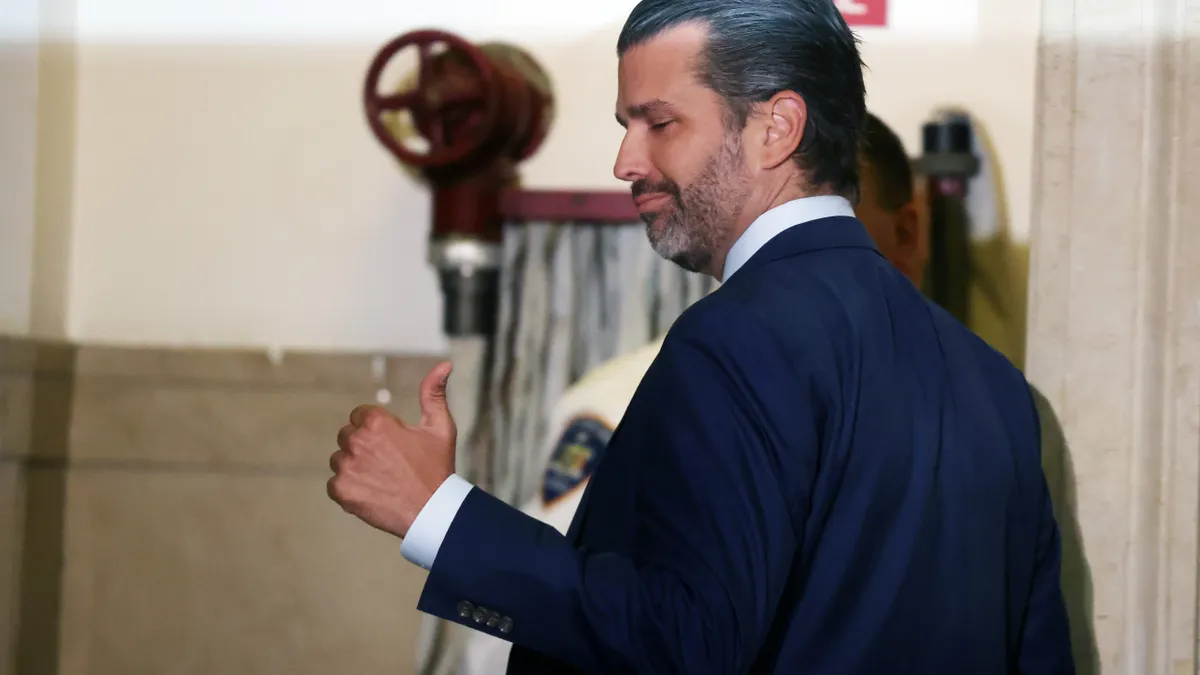Dive Brief:
- Trump Organization ex-CFO Allen Weisselberg would have had authority over the approval of business decisions, Donald Trump Jr. said in testimony Wednesday during New York’s $250 million civil fraud trial against former President Donald Trump.
- Weisselberg’s approval would have been needed on “some things and on other things I had autonomy,” Donald Trump Jr., the son of the former President and an EVP in the Trump Organization, testified Wednesday.
- Trump Jr. testified he “wouldn’t have conducted a refinancing without the involvement of our CFO,” but would have had leeway to conduct a licensing agreement overseas, the former president’s son said when asked by Assistant Attorney General Colleen Faherty what actions Weisselberg would have had authority over. After his father became president, Trump Jr testified that he, his brother and Weisselberg had authority for business decisions at the top of the Trump Organization. They would not have reported to the former president for business decisions.
Dive Insight:
Trump Jr., an EVP of the Trump Organization, was the first of the three eldest Trump children to take the stand. Assistant AG Faherty pressed Trump Jr. about his role within the Trump Organization and as a trustee of the Trump Revocable Trust, a business entity set up by Donald J. Trump to avoid potential conflicts of interest after he became president.
Assistant AG Faherty also questioned Trump Jr. as to the reason behind Weisselberg’s departure from the Trump Organization as well as his removal as a trustee. Trump Jr. was not able to recall the specifics of why Weisselberg left other than that his departure followed some “legal issues he got into,” he said.
The spotlight has swung onto the Trump children this week as New York Attorney General Letitia James’ civil trial against the former president continues. The suit alleges that Trump, along with two of his adult children and senior executives including Weisselberg, also a named defendant in the case, falsely inflated his net worth by billions of dollars to secure bank loans for the Trump Organization on more favorable terms than would otherwise have been available.
Trump Jr.’s testimony came after assertions Tuesday by David Orowitz, formerly the SVP of acquisitions and development at the Trump Organization, that Ivanka Trump was involved in loan negotiations for several key Trump properties in Chicago, Miami and Washington, D.C. Ivanka Trump was involved with Trump’s Old Post Office property in Washington, D.C., Orowitz said Wednesday in a continuation of his testimony. Weisselberg, as the organization’s CFO, was also involved in these negotiations.
“Ivanka wanted me to change the language in the GAAP section. She asked that I review with you,” Orowitz wrote in a 2011 email to Weisselberg, referring to generally accepted accounting principles relating to the OPO property. Any change to GAAP measures would have required Weisselberg’s approval as CFO, Orowitz affirmed when asked.
Ivanka Trump’s participation in the business in particular has led to tension, with Judge Arthur Engoron issuing an order Friday for the former president’s daughter to testify in the trial. A former EVP in the organization, Ivanka Trump was originally a named defendant in the civil case but was removed in June after an appeals court found that AG James’ claims against her were outdated, as she left the Trump Organization in 2017 to take a role in the White House.
“Leave my children alone,” former President Trump said to Judge Engoron in a Wednesday post on Truth Social, where he called the judge “a disgrace to the legal profession.” He also reiterated his claims that there was no wrongdoing and that the banks were paid back in full.
Trump Jr.’s testimony also followed that of state expert witness, Michiel McCarty, chairman and CEO of investment bank M.M. Dillon & Co. In a report prepared for the court, McCarty calculated that lenders to Trump for properties in New York, Chicago, Miami and Washington, D.C. — such as Deutsche Bank, Trump’s largest single lender, and Ladder Capital — lost a collective $168 million in potential interest between 2014 and 2023.
State Attorney Kevin Wallace pointed to a footnote in Judge Engoron’s original summary judgment, which notes that the “subject loans made the banks lots of money; but the fraudulent [Statements of Financial Condition] cost the banks lots of money.”
McCarty, who is being paid approximately $350,000 for his testimony at a rate of $950 an hour as confirmed by Chris Kise, an attorney for the Trump team, agreed with the assessment noted in the footnote.
McCarty’s testimony drew questions from Trump’s attorneys, with Kise arguing that he was speaking to facts that had not been established during the trial. Deutsche Bank executives were not questioned as to whether the bank would have done business with Trump if they were aware that the financial figures he presented were inflated, Kise argued, noting that “they are not ill-gotten gains” if the bank did not testify to that effect.
“Just because the statements may have contained falsities — which you know we disagree with…does not mean the bank would have done something different,” Kise argued.
“I decide if they’re ill-gotten, he’s not deciding that,” Judge Engoron shot back. “He’s deciding the number.”
Trump’s attorneys and Engoron continued to tussle throughout McCarty’s testimony, with Engoron admonishing the team several times for asking questions in a manner which could lead to ambiguous answers as well as for redundant — and lengthy — questions during cross-examination. Kise then accused the judge of setting an unfair standard.
“You never interrupt the prosecution,” Kise said. “You never give them speeches.”
“I stand by my rulings and my statements,” Engoron replied.












